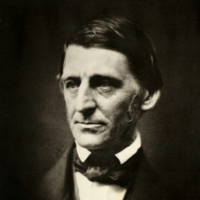Concord Hymn
Sung at the Completion of the Battle Monument, July 4, 1837
Emerson wrote "Concord Hymn" in 1836 for the dedication of the Obelisk, a battle monument in Concord, Massachusetts that commemorated the men that gave their lives at the Battle of Concord (April 19, 1775), the first battle of the American Revolution.
Emerson had been traveling through Europe; upon his return to the United States in 1833 he first lived with his mother in Newton, Massachusetts before moving to Concord in October 1834 to live with his step-grandfather Dr. Ezra Ripley at what was later named The Old Manse. The home stands less than a hundred paces from the spot where the battle took place. Shortly before his marriage to Lydia Jackson in 1835, Emerson purchased a home on the Cambridge and Concord Turnpike which he named "Bush". He quickly became one of the leading citizens in Concord and gave a public lecture to commemorate the 200th anniversary of the town's founding on September 12, 1835.
The "Concord Hymn" was written at the request of the Battle Monument Committee. As part of Concord's Independence Day celebration on July 4, 1837, the poem was first read before sung as a hymn by a local choir using the then-familiar tune "Old Hundredth". Its original title was "Hymn: Sung at the Completion of the Concord Monument, April 19, 1836”.
In the poem, Emerson elevates the event above mere local history and instead sets Concord as the center of the American nation. However, as scholar Lawrence Buell notes, Emerson's poem removes the specific details of the battle and presents a more general "spirit" of revolution and freedom. That spirit, Emerson hopes, will outlive those who fought in the battle.
One source of the hymn's power may be Emerson's personal ties to the subject. His grandfather, Reverend William Emerson, Sr., witnessed the battle at the North Bridge while living at the Old Manse.
Legacy
Emerson's poem became the most-remembered aspect of the dedication of the monument; it was widely republished in newspaper accounts of the day. In contrast, the speech given by Congressman Samuel Hoar is forever lost. In particular, Emerson's line about the "shot heard 'round the world" has become known in popular memory. The opening stanza, which includes the line, was inscribed on the granite pedestal for the Minute Man statue by Daniel Chester French. The statue was dedicated along with a replica of the Old North Bridge at a centennial recognition of the original battle on April 19, 1875. "Concord Hymn" established Emerson as a poet; he was previously known as a lecturer and essayist. Emerson biographer Robert Richardson notes they have since become the most famous lines he ever wrote. Concord's centennial celebration of Emerson's birth in 1903 ended with a singing of the hymn.


